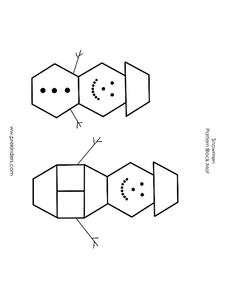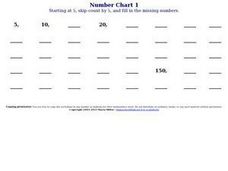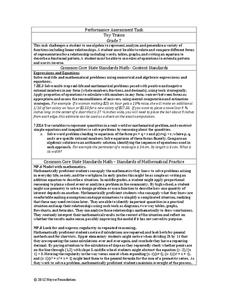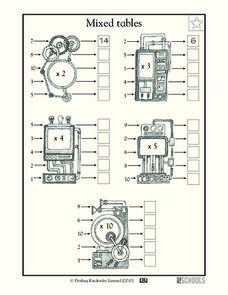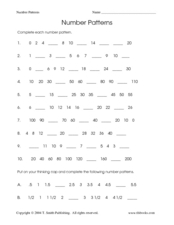PreKinders
Snowmen Pattern Block Mat
Snowmen don't have to be three stacked circles! Practice geometry skills with a holiday-themed pattern block mat that features two smiling snowmen.
Illustrative Mathematics
Multiples of 3, 6, and 7
What are the common multiples of three, six, and seven? Assess young mathematicians ability to find the common multiples of three numbers in a straightforward math task.
PreKinders
Snowman Pattern Block Mat
What do a bunch of rhombuses, squares, and pentagons create? A snowman on a pattern block mat! Let young mathematicians explore shapes to create patterns in this hands-on activity activity.
Gatton Park
Magical Maths
A variety of activities take scholars outside the classroom to explore shapes, symmetry, measurement, patterns, sorting, and time in nature. Learners participate individually, and in teams, to measure found objects, go on a scavenger...
Public Schools of North Carolina
Math Stars: A Problem-Solving Newsletter Grade 1
Keep the skills of your young mathematicians up-to-date with this series of newsletter worksheets. Offering a wide array of basic arithmetic, geometry, and problem solving exercises, this resource is a great way to develop the critical...
University of Utah
Statistics-Investigate Patterns of Association in Bivariate Data
Young mathematicians construct and analyze patterns of association in bivariate data using scatter plots and linear models. The sixth chapter of a 10-part eighth grade workbook series then prompts class members to construct and interpret...
Curated OER
Relate Counting to Addition and Subtraction
Your math scholars may recognize patterns, but do they know they can use them to practice addition and subtraction? This worksheet has scholars counting by threes, fours, and sixes to analyze number patterns and complete a sequence....
Curated OER
Number Chart 12: Skip Counting by 5
In this skip counting worksheet, students fill in the numbers to complete a pattern of skip counting by 5. Students begin with the number 5 and write the numbers as they skip count to 200.
Noyce Foundation
Toy Trains
Scholars identify and continue the numerical pattern for the number of wheels on a train. Using the established pattern and its inverse, they determine whether a number of wheels is possible. Pupils finish by developing an algebraic...
Curated OER
Patterns and Algebra - Modeling
Seventh grade math is so much fun! They solve 10 different problems that include using patterns to complete a table, describe the pattern, and identify the specific term in the pattern for each. Then they give a description of the...
Curated OER
Three Number Sequences Worksheets
Test your students' number line skills with these sequences, which they must finish and then indicate if they are ascending or descending. Numbers range from negative numbers to decimals. This activity would be a great teaching tool for...
Math Learning Center
Second Grade Assessments and Scoring Checklists, Common Core State Standards
How are your second graders progressing in their math skills? Find out with a series of math assessment activities. With baseline assessment score sheets for each skill, you can track how well your kids are adding, subtracting, telling...
PBS
Math with Jake: Frequencies and Pitch
Be an octave above the rest. A musician explains how to write music in different time signatures. An interesting resource continues to demonstrate ratios using the pitch of musical notes and hertz. Pupils use a pitch table and determine...
Curated OER
Number Sequencing Packet
This dynamic 4-page packets challenges students to practice number sequencing. The sequences get progressively more difficult. Your class must count by ones, backwards, by twos, and by threes. Students can complete this packet as an...
Curated OER
First Grade Math
In this math review worksheet, 1st graders answer multiple choice questions about patterns, money, and more. Students answer 16 questions.
Curated OER
Multiplication Sequences
In this math worksheet, students learn that a sequence is a set of numbers which follows a mathematical rule. Students look at math sequences and fill in the missing numbers and also explain in words what the pattern is. Some of the...
Curated OER
Ordering
Four sequences are missing some numbers; can your scholars fill them in? These aviation-themed number sequences require skip counting and counting backward. Beside each pattern learners can reference a jumbled set of numbers inside a...
Curated OER
Multiples
Explore multiples of three and four with 18 sets of numbers. Learners examine each row and circle the multiples of three (for the first nine) and four (for the last nine). There is an example as reference, however none of these are...
Curated OER
Mixed Tables
These dinosaurs act like math machines as scholars practice their division skills. Each one has a given division function to apply to four incoming dividends. Pupils complete the equations, writing in the quotient for each. There are no...
Curated OER
Mixed Tables
Who knows how to operate these multiplication machines? Young mathematicians examine five machines, each with a specific function (i.e. x3) to transform the input numbers to output numbers. They send five numbers through each machine,...
Inside Mathematics
Two Solutions
Many problems in life have more than one possible solution, and the same is true for advanced mathematics. Scholars solve seven problems that all have at least two solutions. Then three higher-level thinking questions challenge them to...
Curated OER
Identifying Patterns
Investigators examine the clues to complete 17 sequences by skip counting backwards. There are two examples to get them started, and all of these patterns include the first three numbers but are missing the last five. If you want...
T. Smith Publishing
Finding Number Patterns
Ten rows of numbers are arranged with three blank spaces in each. Little mathematicians analyze the pattern and fill in the missing numbers. Proper practice for a foundational skill!
Illustrative Mathematics
Complex number patterns
Start off with the definition of the imaginary number i, then have your class practice simplifying expressions involving powers of i and look for patterns. See how the cyclic nature of powers of i translate to sums of powers of i.


